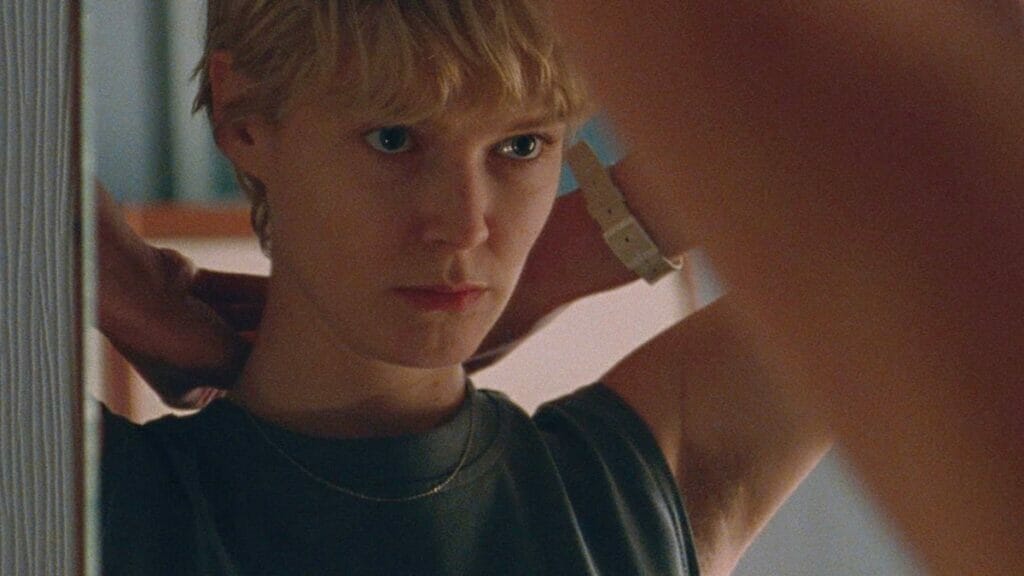Read also:
How to Watch FX Live Without CableHow To Watch AMC Without CableHow to Watch ABC Without CableHow to Watch Paramount Network Without CableThe film is unwilling to transcend its boundaries in its take on Thatcher-era homophobia.
A portrait of a closeted lesbian woman living in England during Margaret Thatcher’s oppressively homophobic 1980s reign, Georgia Oakley’s Blue Jean illustrates a unique paradox for a critic. How does one navigate criticizing a film’s self-imposed binaries while also accounting for the realities of a restrictive period, the gravity of the subject matter (and parallel current circumstances), and the differentiation of what is intended as cinematic affect and what constitutes clumsy filmmaking?
From the first frame, the film lards Jean’s (Rosy McEwen) characterization with obvious signifiers of queer anxiety. She watches straight suitors on Blind Date, meticulously washes her short hair (there’s, of course, a later character beat about her previously longer hair), and deep cleans her sparsely decorated apartment in a fashion that foreshadows the confrontational duality of Jean’s everyday personhood. The presentation of self in public/private spaces, heterosexual/lesbian appearances, and the visibility/invisibility of those masks weigh heavy in all these moments.
The issue is how those conflicting relationships manifest so mechanically in both the writing and filmmaking. Jean’s defined place feels constructed to fish for homophobic suppositions, whether drawn from Jean’s occupation as a female PE teacher (and her androgynous but straight-passing appearance) or her conscious isolation from colleagues. Conversely, Jean’s sister is aware of her sexuality but insists that she hide it. All in the name of ensuring her five-year-old son not be “confused”. Jean’s true community lies at a queer club where her friend group and her butch punk girlfriend Viv (Kerrie Hayes) all live without requiring a daily performance.

Taking place during the time of Thatcher’s Clause 28, which prohibited various bodies, including schools, from providing positive representations of homosexuality, Blue Jean fully embodies that atmosphere. Sloganeering billboards pervade the town. Screeds about nuclear families are unavoidable on the radio. Even Jean’s students are becoming more casual and vocal in their homophobia. Jean is also descending into her own fugue state. It’s rendered in dreary, metronomic compositions that convey her repression. When not awake, she has bluntly symbolic dreams about cats peering down over fish tanks or juking a marauding group of students rushing at her.
The arrival of a new student Lois is key to revealing this escalating hostility (Lucy Halliday). Lois has been marked an outcast by her disheveled appearance and rumors of being a lesbian. Jean senses a kindred spirit in the bullied Lois, even as she fears treating her with anything but discernible neutrality. That separation becomes nigh impossible as Lois arrives in Jean’s safe space and integrates herself into her friend group.
Blue Jean as a film rarely seems interested in extending its empathies beyond their effect on the main character.
Shifting into survival mode, Jean blackmails Lois. She demands that her student never return to the club, ensuring an awkward continuing relationship. Blue Jean, as a whole, pivots as a narrative on the implications of this moment. On the precedent it sets for how Jean responds to Lois’ queerness. Especially as Lois becomes wrapped up in a manipulative but cruelly believable she said-she said situation with Siobhan (Lydia Page), another of Jean’s students. She seeks to dodge the consequences of her actions by accusing Lois of assaulting her.
What’s unusual about this turn is that the events feel essential to the film’s arc. However, they also come so late that their provocative nature feels like exactly that – a provocation. Its inclusion makes Lois into little more than leverage for Jean’s growth instead of a real young woman rejected by the world around her.
But Blue Jean as a film rarely seems interested in extending its empathies beyond their effect on the main character. That’s the only way to square a jarringly tone-deaf scene ending with imagery of wild horses symbolizing the character’s freedom. Those moments ultimately define Blue Jean, a film that’s unwilling to transcend its boundaries.
Blue Jean is currently hiding in plain sight in select theatres.